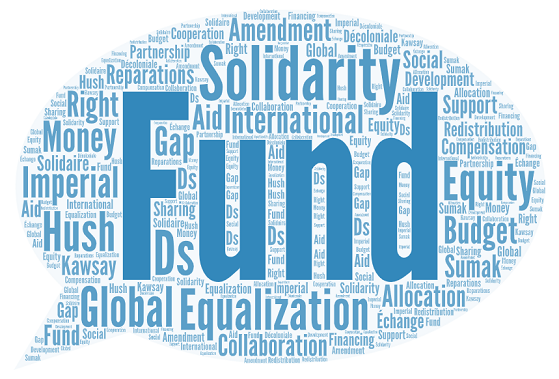Let’s call a spade a spade: reflections on our language consultations.
On by Hamimu Masudi
After a successful consultation process under the theme, “Reimagining Solidarity: How can we move beyond the ‘aid’ narrative?” that took place between October 11 and December 10, the Track Changing group of the Kampala Initiative (on Beyond aid) is thrilled to share with you, preliminary updates on

After a successful consultation process under the theme, “Reimagining Solidarity: How can we move beyond the ‘aid’ narrative?” that took place between October 11 and December 10, the Track Changing group of the Kampala Initiative (on Beyond aid) is thrilled to share with you, preliminary updates on the outcomes.
The online survey received suggestions from 13 countries (Nigeria, South Africa, Kenya, Uganda, India, Moldova, UK, Belgium, Canada, Denmark, US, France and Finland), to replace the word ‘aid’. Outcomes from the two parallel process– the online survey and webinar series- revealed a clear message that the current language of aid is problematic. The following key statements made during the webinar conversations highlight the harms:
- “aid makes us feel all warm and fuzzy and benevolent inside. It doesn’t require us to ask ourselves uncomfortable questions … it almost sanitises the actual issues by suggesting that aid alone is the solution” […] Go HERE for more.
- “aid removes any historical or colonial legacy and the hand we’ve played in contributing towards poverty and instability around the world…it ignores geopolitics and the myriad issues that both cause and perpetuate poverty, [such as] climate change and insecurity” Go HERE for more
- “the aid language interferes with social contracts. The State feels it is only answerable to donors […] governments become passive participants in the governance of countries” (from Nigeria and Uganda webinars)
- “the narrative is divisive, creating bad vibes between the poor–those (poor) in the so called wealthy countries are not happy that their governments ignores their plight and instead chooses to send billions in aid to the poor in other countries. This undermines global solidarity” (from globally webinar)
To describe how language is important and what a shift would bring to the struggle for equality, conversations from the webinars centered around the following statements:
- “Language gives the struggle an identity and helps determine how politics will be played”
- “Language is a tool for political change”
- “Language will expose tax dodging practices of corporates”
- “Language will expose unfair debt conditions of governments”
- “Language will expose aid institutions”
It is particularly striking how outcomes from the online survey echo what transpired during the webinars series. From “compensation”, “redistribution” and “international support” to “equity gap fund”, “equalization fund” and “social equity financing”, the [popularly] proposed alternative terms were unanimous in their rejection of the damaging aid narrative and the need to tackle the root causes of global inequalities.
Of course this all adds up to nothing if the wider sector does not switch to this new language. On our part as members of the Kampala Initiative, we commit to using this new range of appropriate terms in reference to the financial assistance that the so called wealthy countries send countries in the global South.
We know these new terms will go further in exposing global inequalities and help the movement redefine how to mobilize for change. It will support our demands that in order to address global poverty, inequalities and poor health, corporates must pay their fair share of taxes; aid institutions like FCDO must change their mandate to that of addressing global inequalities; and governments must rethink debt conditions, climate change and insecurity – because these are the real drivers of global poverty, poor health and inequities.
Special thanks go out to our webinar panelists and hosts, your time and knowledge that you brought to the conversations are invaluable and much appreciated. We look forward to regrouping and publishing a selection of the favoured alternatives in the New Year.
[PANELISTS] Her Excellency, Prof. Adenike Grange [Nigeria webinar]; Ambs Hassan Muhammed Ngubdo [Nigerian webinar]; Prof Joseph Ana [Nigeria webinar]; Bisi Bright [Nigeria webinar]; Michael Tchokpodo [Benin webinar]; Baijayanta Mukhopadhyay [Benin webinar]; Ludmila Andrade [Benin webinar]; Dennis Bukenya [Uganda webinar]; Allana Kembabazi [Uganda]; Sarah Amulo [Uganda webinar]; Dr. Danny Gotto [Global webinar]; Maryam Mohsin [Global webinar]; Joan Okitoi [Global webinar]; Monicah Yator [Global webinar]; Catalina Salazar [Global webinar]; Martin Drewry [Global webinar]; and Tammam Aloudat [Global webinar].
[HOSTS] Lizzy Igbine [Nigeria webinar]; Akaninyene Obot [Nigeria webinar]; Spéro Hector Ackey [Benin webinar]; Dr. Danny Gotto [Uganda webinar]; Hamimu Masudi [Global webinar]

